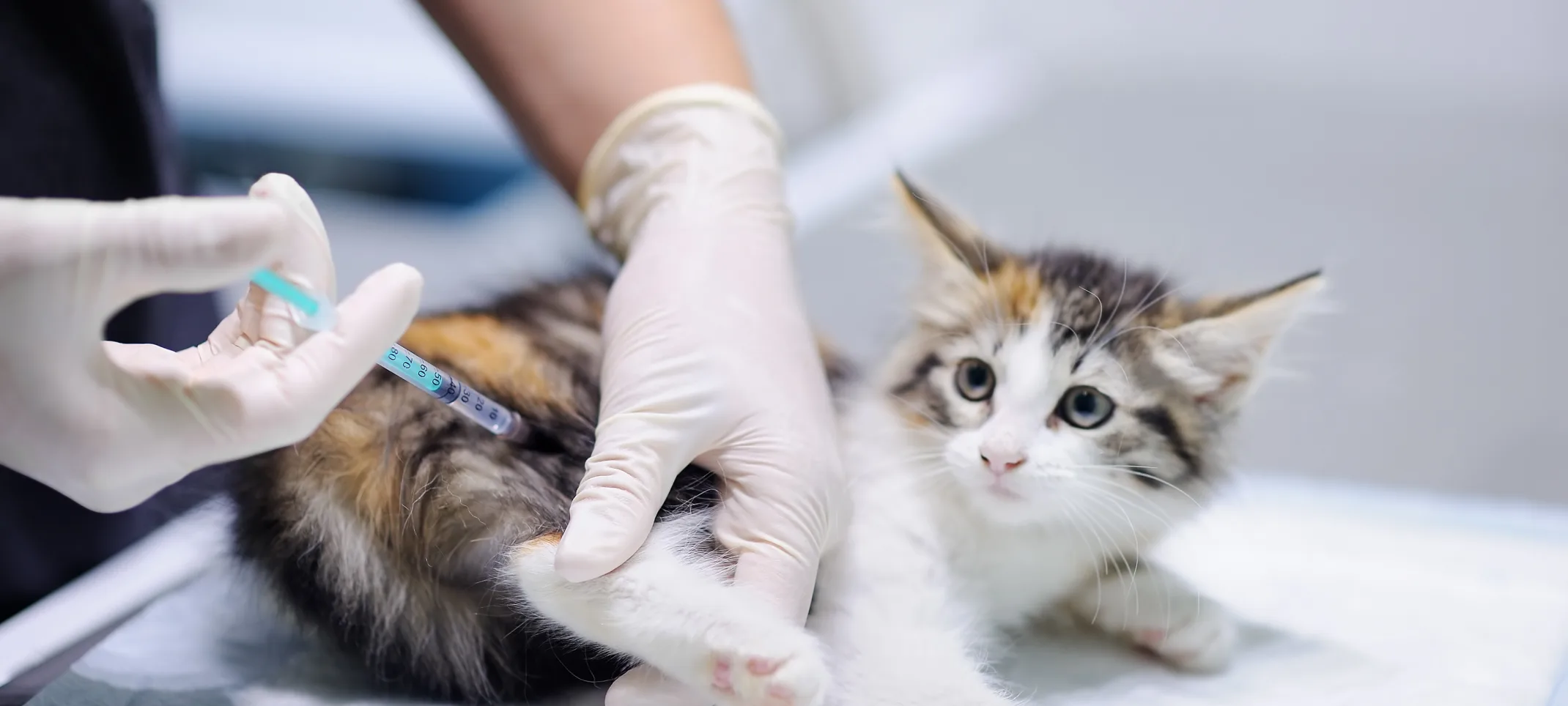Pet's Friend Animal Clinic
Feline Vaccines
Preventative care is an important aspect in maintaining your cat’s health. Proper vaccination is vital in protecting them against harmful diseases.

Rabies
Rabies is a virus that affects the brain and spinal cord of all mammals, including dogs, cats and humans. Though preventable, there is good reason that the word “rabies” evokes fear in people. The disease has been reported in every state except Hawaii, and everywhere throughout the world except for Australia and Antarctica. Annually, rabies causes the deaths of more than 50,000 humans and millions of animals worldwide. Once symptoms appear, the disease results in fatality.
Unvaccinated animals who are allowed to roam outdoors without supervision are most at risk for infection. If they’re exposed to wild animals, they have a greater chance of fighting with infected stray or wild animals. There is no accurate test to diagnose rabies in live animals. The direct fluorescent antibody test is the most accurate test for diagnosis, but because it requires brain tissue, it can only be performed after the death of the animal. There is no treatment or cure for rabies once symptoms appear. Since rabies presents a serious public health threat, animals that are suspected of having the virus are most often euthanized.
Vaccinating your pet not only protects them from getting rabies, it protects them if they bite someone. Dogs or cats that have bitten humans are required to be confined for at least 10 days to see if signs of rabies develop. If the animal’s vaccination records are not current, a lengthy quarantine or even euthanasia may be mandated. In many areas of the country, the law requires that all domestic dogs and cats are vaccinated at or after the age of 3 months. Avoiding contact with wild animals is also necessary for prevention. You can greatly decrease chances of rabies transmission by walking your dog on a leash, and by keeping your cat indoors. Since even indoor only pets are not completely without risk, and due to the human health risk with fatal nature of the disease, we generally recommend all pets be vaccinated for rabies. If you have further questions, please ask your veterinarian. At Pet’s Friend Animal Clinic, we use the Merial PureVax® modified live virus vaccine. Legally, we can give kittens their first Rabies vaccine at 16 weeks of age then will need an annual booster after that.
FVRCP Vaccine
Feline Rhinotracheitis-Calici-Panleukopenia vaccine is a quality core vaccine which prevents cats against the most threatening viral infections—calicivirus, herpesvirus, and the deadly feline parvovirus, panleukopenia. At P.F.A.C. we use Nobivac Feline 1-HCP modified live virus vaccine for the vaccination of healthy cats 9 weeks of age and older. Kittens will need a series of boosters after the initial vaccine and then annually after their kitten vaccines are complete. Most adult cats will then receive this vaccines every 3 years.
Feline Leukemia (FeLV)
Feline Leukemia Virus, a retrovirus, is unfortunately a common infection among cats, especially those who are allowed outside. The virus is spread through contact with the saliva, blood, or urine of an infected cat, most commonly saliva or from mother to kitten. It also can be spread through friendly contact. While most infected cats will shed the virus and become immune, cats that do not become immune sicken quickly—85% of cats die within 3 years of diagnosis—and once the virus spreads to the bone marrow there is no effective treatment for the disease. Because of this poor prognosis, prevention is especially important. There are several ways of preventing your kitty from contracting this disease: The easiest preventive method is simply to avoid exposure. Keep your cat indoors, away from other neighborhood cats and feral cat colonies that are likely to harbor active infections.
Screen all newly-adopted cats and kittens for infection. A simple blood test, run in the hospital, can tell us whether or not your kitty has the virus within 30 minutes. Since the virus may not be detectable for 1-3 months after infection, it is recommended that kittens be tested after six months of age, even if tests performed at a younger age show the kitten is negative to be absolutely sure.
Vaccinate! Cats are most susceptible to infection with FeLV as kittens, so the AVMA and AAFP both recommend a series of 2 FeLV vaccines for ALL kittens up to 1 year of age, regardless of exposure. This is to be followed by a booster after one year of age for adult cats with continuing risk of exposure.
If you decide to keep a kitty who is infected with Feline Leukemia, you should maintain your household as a “closed colony.” In other words, do not introduce any new cats to the house unless they are already infected with the virus too. Luckily, the virus dies quickly once outside a cat’s body, so new, healthy cats may be safely introduced within days of the departure of an FeLV-positive kitty.
For more information, please feel free to call Pet's Friend Animal Clinic about any questions or concerns you may have at 408-739-2688.
